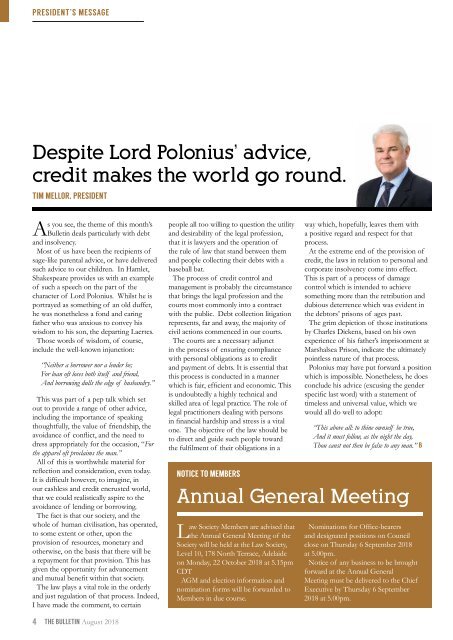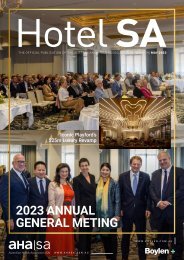The Bulletin August 2018
You also want an ePaper? Increase the reach of your titles
YUMPU automatically turns print PDFs into web optimized ePapers that Google loves.
PRESIDENT’S MESSAGE<br />
Despite Lord Polonius’ advice,<br />
credit makes the world go round.<br />
TIM MELLOR, PRESIDENT<br />
As you see, the theme of this month’s<br />
<strong>Bulletin</strong> deals particularly with debt<br />
and insolvency.<br />
Most of us have been the recipients of<br />
sage-like parental advice, or have delivered<br />
such advice to our children. In Hamlet,<br />
Shakespeare provides us with an example<br />
of such a speech on the part of the<br />
character of Lord Polonius. Whilst he is<br />
portrayed as something of an old duffer,<br />
he was nonetheless a fond and caring<br />
father who was anxious to convey his<br />
wisdom to his son, the departing Laertes.<br />
Those words of wisdom, of course,<br />
include the well-known injunction:<br />
“Neither a borrower nor a lender be;<br />
For loan oft loses both itself and friend,<br />
And borrowing dulls the edge of husbandry.”<br />
This was part of a pep talk which set<br />
out to provide a range of other advice,<br />
including the importance of speaking<br />
thoughtfully, the value of friendship, the<br />
avoidance of conflict, and the need to<br />
dress appropriately for the occasion, “For<br />
the apparel oft proclaims the man.”<br />
All of this is worthwhile material for<br />
reflection and consideration, even today.<br />
It is difficult however, to imagine, in<br />
our cashless and credit encrusted world,<br />
that we could realistically aspire to the<br />
avoidance of lending or borrowing.<br />
<strong>The</strong> fact is that our society, and the<br />
whole of human civilisation, has operated,<br />
to some extent or other, upon the<br />
provision of resources, monetary and<br />
otherwise, on the basis that there will be<br />
a repayment for that provision. This has<br />
given the opportunity for advancement<br />
and mutual benefit within that society.<br />
<strong>The</strong> law plays a vital role in the orderly<br />
and just regulation of that process. Indeed,<br />
I have made the comment, to certain<br />
people all too willing to question the utility<br />
and desirability of the legal profession,<br />
that it is lawyers and the operation of<br />
the rule of law that stand between them<br />
and people collecting their debts with a<br />
baseball bat.<br />
<strong>The</strong> process of credit control and<br />
management is probably the circumstance<br />
that brings the legal profession and the<br />
courts most commonly into a contract<br />
with the public. Debt collection litigation<br />
represents, far and away, the majority of<br />
civil actions commenced in our courts.<br />
<strong>The</strong> courts are a necessary adjunct<br />
in the process of ensuring compliance<br />
with personal obligations as to credit<br />
and payment of debts. It is essential that<br />
this process is conducted in a manner<br />
which is fair, efficient and economic. This<br />
is undoubtedly a highly technical and<br />
skilled area of legal practice. <strong>The</strong> role of<br />
legal practitioners dealing with persons<br />
in financial hardship and stress is a vital<br />
one. <strong>The</strong> objective of the law should be<br />
to direct and guide such people toward<br />
the fulfilment of their obligations in a<br />
NOTICE TO MEMBERS<br />
way which, hopefully, leaves them with<br />
a positive regard and respect for that<br />
process.<br />
At the extreme end of the provision of<br />
credit, the laws in relation to personal and<br />
corporate insolvency come into effect.<br />
This is part of a process of damage<br />
control which is intended to achieve<br />
something more than the retribution and<br />
dubious deterrence which was evident in<br />
the debtors’ prisons of ages past.<br />
<strong>The</strong> grim depiction of those institutions<br />
by Charles Dickens, based on his own<br />
experience of his father’s imprisonment at<br />
Marshalsea Prison, indicate the ultimately<br />
pointless nature of that process.<br />
Polonius may have put forward a position<br />
which is impossible. Nonetheless, he does<br />
conclude his advice (excusing the gender<br />
specific last word) with a statement of<br />
timeless and universal value, which we<br />
would all do well to adopt:<br />
“This above all: to thine ownself be true,<br />
And it must follow, as the night the day,<br />
Thou canst not then be false to any man.” B<br />
Annual General Meeting<br />
Law Society Members are advised that<br />
the Annual General Meeting of the<br />
Society will be held at the Law Society,<br />
Level 10, 178 North Terrace, Adelaide<br />
on Monday, 22 October <strong>2018</strong> at 5.15pm<br />
CDT<br />
AGM and election information and<br />
nomination forms will be forwarded to<br />
Members in due course.<br />
Nominations for Office-bearers<br />
and designated positions on Council<br />
close on Thursday 6 September <strong>2018</strong><br />
at 5.00pm.<br />
Notice of any business to be brought<br />
forward at the Annual General<br />
Meeting must be delivered to the Chief<br />
Executive by Thursday 6 September<br />
<strong>2018</strong> at 5.00pm.<br />
4<br />
THE BULLETIN <strong>August</strong> <strong>2018</strong>


















